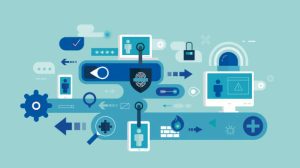In an era where our digital lives are more intertwined than ever before, safeguarding our devices and data has become paramount. The term “endpoint security” has gained prominence as a comprehensive approach to ensuring that your devices remain the stalwart defenders of your digital kingdom. In this blog post, we’ll explore the importance of endpoint security and how it plays a crucial role in protecting your devices and data.
The Endpoint Security Imperative
Defining Endpoint Security
Endpoint security refers to the protection of individual devices (endpoints) such as laptops, desktops, smartphones, and servers from cyber threats. It encompasses a wide range of security measures designed to safeguard these endpoints from attacks.
The Proliferation of Endpoints
With the proliferation of remote work and the Internet of Things (IoT), the number of endpoints within an organization has grown exponentially. Each endpoint represents a potential entry point for cybercriminals, making comprehensive security paramount.
The Role of Endpoint Security
Threat Prevention
Endpoint security solutions are designed to prevent a wide range of threats, including malware, ransomware, viruses, and phishing attacks. They act as the first line of defense against these malicious entities.
Real-time Monitoring
Endpoint security tools provide real-time monitoring of endpoints, detecting suspicious activities and potential security breaches. Any unusual behavior triggers immediate alerts for investigation.
Vulnerability Assessment
Regular vulnerability assessments identify weaknesses in endpoint configurations, software, and security policies. These assessments enable proactive patching and updates to address vulnerabilities before they are exploited.
Data Protection
Endpoint security extends to data protection, ensuring that sensitive information remains encrypted and secure. This is especially critical as endpoints often contain valuable business data.
Centralized Management
Endpoint security solutions offer centralized management, allowing administrators to oversee and control security policies across all endpoints from a single console.
Components of Endpoint Security
- Antivirus and Antimalware
These components scan and detect malicious software, preventing it from infecting endpoints.
- Firewall Protection
Firewalls block unauthorized access and traffic, acting as a barrier between your device and potential threats.
- Intrusion Detection and Prevention Systems (IDPS)
IDPS systems monitor network traffic for suspicious activities and take action to prevent breaches.
- Encryption Tools
Encryption secures data, ensuring that even if an endpoint is compromised, the data remains unreadable to unauthorized individuals.
- Patch Management
Patch management ensures that software and operating systems are up to date with the latest security patches and updates.
- Behavioral Analysis
Behavioral analysis tools identify anomalous behavior on endpoints, allowing for early threat detection.
The Human Element
While endpoint security tools are invaluable, the human element remains crucial. Employee training and awareness about security best practices are essential components of a holistic endpoint security strategy.
Endpoint security is not just an option; it’s a necessity in today’s digital landscape. As our lives become increasingly interconnected through digital devices, the need to protect these endpoints from cyber threats has never been more critical. Endpoint security solutions are the guardians of your digital realm, defending your devices and data from malicious intruders. In a world where data is a prized asset, investing in endpoint security is not just a measure of prudence; it’s a commitment to safeguarding your digital assets and preserving your peace of mind.
SCHEDULE your FREE technology audit and DOWNLOAD our FREE cybersecurity eBook today!






